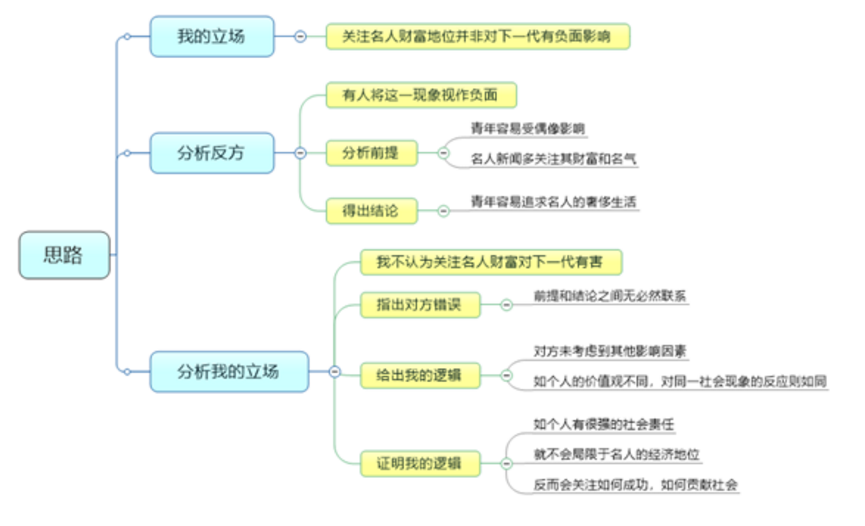观点类大作文,社会类话题
Nowadays celebrities are more known for their glamour and wealth than for their achievement, and this sets a bad example to young people. To what extent do you agree or disagree?
题目来源:2020年12月12日大陆雅思大作文
题目大意
名人更多以其魅力和财富为人所知而不是成就,这对下一代产生负面影响。你在多大程度上同意或不同意?
思路解析
这是一道观点类考题,社会话题。有烤鸭考完来表示:这道题好难,观点都想不出。月半鸭表示,那你微博热搜真是白看了。不是因为成就而是因为魅力和财富而成名的人,有一个例子:丁真(不知道这个人是谁的同学可以去微博或者B站补一下课),但这个人对年轻人都是负面案例吗?他对很多女生来说起码不是。从其他反应来看,也是一个鼓励的态度。
月半鸭一直说,很多雅思考试都是很有现实意义的,你完全能从生活中找到题目想讨论的问题,所以不要觉得雅思写作很枯燥很难,就像这道题。同学们思考下,为什么丁真却不是一个负面案例呢?我们要论证清楚这个问题,就要回来看这道题目本身。
题目本身其实有两个逻辑基点,是“名人更多是因为glamour and wealth 成名而不是 achievement”,你同意了这个前提后,才是第二个问题“这是是不是 a bad example”。
所以我们写反对角度的话,首先就反对头一个前提。如今很多名人是因为成就而成名的,比如体育明星(科比)、医生(钟南山)、演员(成龙)、科学家(袁隆平)等等。人们会知道他们就是因为他们在专业领域中获得了巨大的成就和贡献。而这些人想要从事同行业的年轻人或者普通人都是有着非常大的激励作用。
那么,如果我们赞同了头一个前提,那就来看,它到底是不是一个负面例子。
会成为负面例子主要因为它会引导年轻人产生错误的价值观,只追求外表的美丽,或者希望通过博眼球的方式成名或者获取财富,这可能就让有些年轻人觉得,我要成名也可以这么做,而忽略了对于学业、事业和内在精神的追求。比如受到一些流量明星或者网红主播的影响,一些年轻女生可能会觉得我只需要外表美丽就能出名或者嫁入豪门。但是这样成功的几率其实极低,而且因为忽略了其他方面的培养,导致这些年轻人在学习或工作上很难有竞争力,白白耽误人生。
而不会成为负面例子的原因也有两方面。
一是很多名人的财富本身也是积累和奋斗出来的,那么年轻人想要获得同样的财富,可能也会去关注过程学习成功经验,或者受到激励去为将来奋斗。
二是这些名人出名后,可能会引发年轻人对于一些领域的关注或者带来积极效应。比如丁真,他成名后,可能会让年轻人更多关注少数民族(藏族)的生活,了解其文化;可能会让人们更向往一种自然纯真的生活,甚至精神上的治愈;可能会为当地旅游业和发展带来好处。这些因为成名带来的好处,既可以激励家乡的年轻人为自己的家乡做更多贡献,也可以激励其他年轻人关注这个世界。
提纲
范文示例
Today, celebrities are more reported for their material worth rather than their contributions to the world; this phenomenon is considered a negative impact on younger generations. In my opinion, however, I would say it is simplistic to negate any social issues without scrutinizing the complex context where the discussion takes place.
There seems to be reasons why the fascination for celebrities’ social status has been frowned upon by some educationalists. It is true than young minds are susceptible to what is publicized of their idols, whether these be their spending on art collections, luxurious goods, or participation in charitable events; unfortunately, the majority of coverages are focusing on their glamour and wealth. That leads to the apprehension that adolescents exposed to such an environment may opt to idolize such role models and therefore to judge one’s value by their material possession.
While the problems mentioned above do contribute to the materialism among the youth, I will say it is simplified to dismiss the justification of people’s focusing on celebrities’ socioeconomic aspect. The advocates of the claim in the topic are oblivious to the fact that the implications of a social phenomenon are not a binary result derived from an either-or logic; rather, its ramifications are subject to various determining factors, such as the moral convictions or social consciousness of individuals. For example, for youngsters with a strong sense of social responsibility, the same stories of fame and wealth may stimulate their ambitions to pursue career success with an aspiration to be a more contributive social member.
In conclusion, it is illogical to dismiss the justification of people’ concern for celebrities’ socioeconomic status while ignoring other determinants relevant to the discussion.


